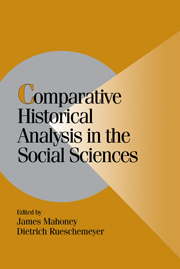Book contents
- Frontmatter
- Contents
- Contributors
- Preface
- Introduction
- I Accumulation of Research
- II Analytic Tools
- 5 BIG, SLOW-MOVING, AND … INVISIBLE
- 6 HOW INSTITUTIONS EVOLVE
- 7 USES OF NETWORK TOOLS IN COMPARATIVE HISTORICAL RESEARCH
- 8 PERIODIZATION AND PREFERENCES
- III Issues of Method
- Conclusion
- Index
- Cambridge Studies in Comparative Politics
- References
5 - BIG, SLOW-MOVING, AND … INVISIBLE
MACROSOCIAL PROCESSES IN THE STUDY OF COMPARATIVE POLITICS
Published online by Cambridge University Press: 05 June 2014
- Frontmatter
- Contents
- Contributors
- Preface
- Introduction
- I Accumulation of Research
- II Analytic Tools
- 5 BIG, SLOW-MOVING, AND … INVISIBLE
- 6 HOW INSTITUTIONS EVOLVE
- 7 USES OF NETWORK TOOLS IN COMPARATIVE HISTORICAL RESEARCH
- 8 PERIODIZATION AND PREFERENCES
- III Issues of Method
- Conclusion
- Index
- Cambridge Studies in Comparative Politics
- References
Summary
[W]e must question if the particular moment matters. Political science owes much of its origin to political journalism. And like political journalism we have an excessive tendency to concentrate on the here and now, a blindness toward movements on a grander time scale. Processes are not so easily captured, but the postulate on which this work must stand is that they matter more.
– Edward Carmines and James Stimson (1989)[R]esearch is a game against nature in which nature counters with a strategy of concealment…. Obviously, the effectiveness of a given strategy of discovery will depend on nature's strategy of concealment, and conversely, the effectiveness of the laws of nature as a strategy of concealment will depend on the strategy chosen by research workers. In due course it will be shown that a rather simple strategy of concealment may be quite effective given a certain strategy of discovery. As a first step we may ask, what is the favorite strategy of sociologists? It is a marked characteristic of sociological research that it is preoccupied with cross-sectional study of small units, often individuals.
– Gøsta Carlsson (1972)Politics is a strong and slow boring of hard boards.
– Max Weber (1946 [1921])Many important social processes take a long time – sometimes an extremely long time – to unfold. This is a problematic fact for contemporary social science, particularly in areas of inquiry where individual strategic action has become the central vantage point for framing questions and answers about social life.
- Type
- Chapter
- Information
- Comparative Historical Analysis in the Social Sciences , pp. 177 - 207Publisher: Cambridge University PressPrint publication year: 2003
References
- 143
- Cited by



